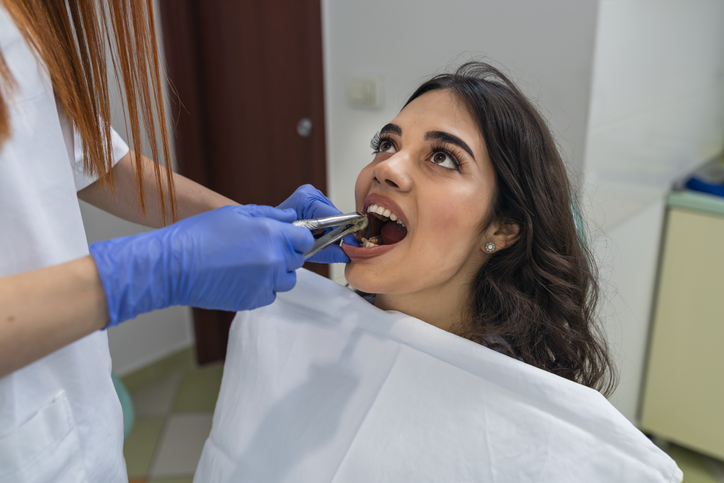
Nobody wants to get a tooth pulled. But a surgical removal might save your oral health.
Your dentist will always take every measure to save a tooth. Fillings, crowns, and root canals are all procedures to help you avoid extraction, as they keep most of the tooth intact. But a surgical tooth extraction may be necessary when a tooth becomes severely decayed or broken.
In most cases, a simple extraction can remove the tooth. For more complicated situations, a surgical extraction is the best option. But don’t worry! During either procedure, your dentist will help you feel comfortable, and your oral health will improve. Let’s go over each procedure and what to expect afterward.
Simple vs. surgical extraction
Before the extraction, your dentist will take X-rays to check the tooth’s condition. This will help determine whether a simple extraction or surgical removal is needed. Generally speaking, a tooth situated well above the gumline can be pulled with forceps in a simple extraction.
If a tooth has deep roots, is cracked at the gum line, is buried under gum tissue or bone, or is impacted, such as in the case of a wisdom tooth, your dentist will recommend a surgical extraction.
Your dentist may refer you to an oral surgeon to perform a surgical extraction. Oral surgeons are the most skilled at doing this type of extraction. During the procedure, intravenous (IV) sedation may be administered to make you comfortable. If you undergo IV anesthesia, you should arrange a ride home.
Once the tooth is removed, the surgeon will stitch up the extraction site. A gauze pad covering the area must be kept on for a few hours to allow a clot to form. The clot helps the healing process by protecting the nerves and bone. If the clot dislodges, a painful dry socket may develop.
Your surgical extraction aftercare program
You can expect to experience minor bleeding and swelling after the surgical removal. Within 48 to 72 hours, you should begin to feel better and can return to your routine. To ensure proper healing, you’ll need to follow some aftercare instructions during that time, such as:
Giving your mouth a rest. After any surgical procedure, your body needs to rest. Your mouth is no different. Try not to talk, eat, or drink for two hours after the procedure. Also, avoid sipping through a straw, smoking, or spitting, as those actions could displace the clot over the extraction site.
Keeping the site clean. To freshen your mouth, rinse with a prescription antimicrobial mouthwash or warm salt water. Avoid brushing your teeth for at least 12 hours after the procedure. When your dentist gives you the okay, you can brush your teeth, but avoid the area around the extraction site until it completely heals.
Eating a soft diet. Eating hard, crunchy foods will only aggravate the extraction site. Switch to soft foods such as yogurt, eggs, pasta, and applesauce. If you’re having a smoothie, remember not to drink through a straw.
Avoiding strenuous exercise. Although you can return to your routine, avoid strenuous activities or workouts for two to three days.
Taking your medications. Your dentist may prescribe pain medications to relieve your discomfort. Take them as instructed.
Any excessive bleeding must be reported to your dentist. Contact your dentist immediately if you develop a fever or pus drains from the extraction site. Although rare, complications may occur, including infection and nerve damage.
Getting a tooth pulled is never a pleasant experience, but it may be required to improve your overall oral health. The good news is that it doesn’t have to get to that point if you practice good oral hygiene daily. Brushing and flossing daily, avoiding sweets, and visiting your dentist twice yearly can make a tooth extraction unnecessary.
Keep up with your dental appointments
Schedule an appointment at Espire’s Mission Valley, California, location today! Our highly trained dentists can check your teeth and decide if an extraction is necessary. If needed, we’ll make it a comfortable experience. Don’t live near our Mission Valley, CA office? Find one of our other locations near you.
Mission Valley, CA
8989 Rio San Diego Drive
Suite 170
San Diego, CA 92108
